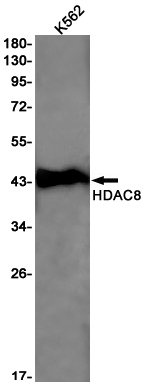
| WB | 1/500-1/1000 | Human,Mouse,Rat |
| IF | 1/20 | Human,Mouse,Rat |
| IHC | 咨询技术 | Human,Mouse,Rat |
| ICC | 技术咨询 | Human,Mouse,Rat |
| FCM | 咨询技术 | Human,Mouse,Rat |
| Elisa | 咨询技术 | Human,Mouse,Rat |
| Aliases | HDAC8; HDACL1; CDA07; Histone deacetylase 8; HD8 |
| Entrez GeneID | 55869 |
| WB Predicted band size | Calculated MW: 42 kDa; Observed MW: 42 kDa |
| Host/Isotype | Rabbit IgG |
| Antibody Type | Primary antibody |
| Storage | Store at 4°C short term. Aliquot and store at -20°C long term. Avoid freeze/thaw cycles. |
| Species Reactivity | Human |
| Immunogen | A synthetic peptide of human HDAC8 |
| Formulation | Purified antibody in TBS with 0.05% sodium azide,0.05%BSA and 50% glycerol. |
+ +
以下是关于HDAC8抗体的3篇代表性文献的简要总结:
---
1. **"HDAC8-mediated anticancer therapy"**
*作者:Olsen, C.A. 等(2014)*
摘要:该研究验证了一种高特异性HDAC8抗体的应用,通过抑制HDAC8活性探究其在急性白血病细胞中的功能,发现HDAC8选择性抑制剂可诱导癌细胞凋亡,提示其作为治疗靶点的潜力。
2. **"Immunohistochemical analysis of HDAC8 expression in human cancers"**
*作者:Waltregny, D. 等(2004)*
摘要:利用特异性HDAC8抗体分析多种肿瘤组织样本,发现HDAC8在前列腺癌等癌症中高表达,且与肿瘤侵袭性相关,支持其在癌症进展中的作用。
3. **"Structural and functional characterization of HDAC8 antibodies for epigenetic studies"**
*作者:Haberland, M. 等(2009)*
摘要:系统评估了多种HDAC8抗体的特异性,确认其在染色质免疫共沉淀(ChIP)中的适用性,揭示了HDAC8在基因沉默和细胞分化中的表观遗传调控机制。
---
以上文献涵盖了HDAC8抗体的功能验证、癌症研究应用及表观遗传机制探索,可作为相关研究的基础参考。
Histone deacetylase 8 (HDAC8) is a class I HDAC enzyme that plays a critical role in epigenetic regulation by catalyzing the removal of acetyl groups from lysine residues on histones and non-histone proteins. This activity modulates chromatin structure and gene expression, influencing cellular processes such as cell cycle progression, differentiation, and apoptosis. HDAC8 is distinct among HDACs due to its unique structural features, substrate specificity, and localization in both the nucleus and cytoplasm. It is implicated in various diseases, including cancers (e.g., neuroblastoma, leukemia), neurological disorders, and Cornelia de Lange syndrome (CdLS), where mutations in HDAC8 are linked to developmental defects.
HDAC8 antibodies are essential tools for studying its expression, localization, and function in biological systems. They are widely used in techniques like Western blotting, immunohistochemistry, immunofluorescence, and chromatin immunoprecipitation (ChIP) to assess HDAC8 protein levels, tissue distribution, and interactions with molecular partners. Researchers also utilize these antibodies to evaluate HDAC8 inhibition by small molecules or therapeutic agents in drug discovery, particularly in oncology. Commercially available HDAC8 antibodies vary in clonality, species reactivity, and application specificity, requiring validation for experimental consistency. As HDAC8 emerges as a potential therapeutic target, its antibodies remain pivotal for elucidating disease mechanisms and advancing targeted epigenetic therapies.
×